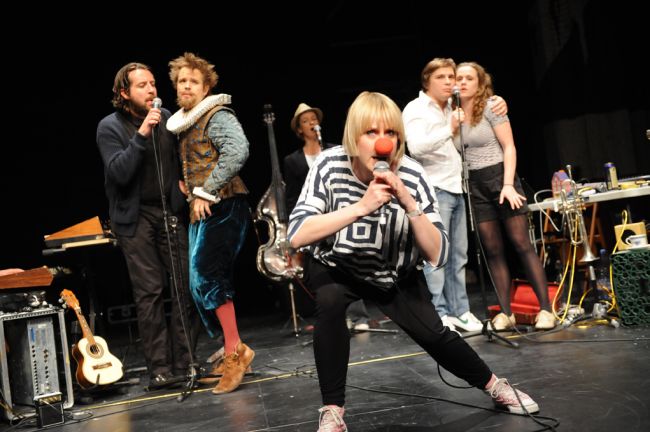
Twelfth Night at the Sherman Theatre, Cardiff
Writer: William Shakespeare
Production by Filter Theatre in association with the RSC
Director Sean Holmes, redirected by Oliver Dimsdale & Ferdy Roberts
Rating: [4.OO]
Review by Third Age critic Barbara Michaels.
Opening with a cacophony of sound, accompanied by a robust rendering of “If music be the food of love, play on,” Filter Theatre’s production of Shakespeare’s Twelfth Night, is raucous, lively and highly comedic. If the intention was to shock those who prefer their Shakespeare in more traditional style, then it succeeds.
This is a radical interpretation of the original comedy of unrequited lover and mistaken identity in the fictional land of Illyria – where all is not as it seems. Both innovative and clever, the production relies on the interaction of cast on stage (and, some of the time, seated in the audience too) and audience – plus musical backing or, rather, participation. There are times when it is possible to have too much of a good thing and, despite being performed by accomplished musicians and an integral part of the whole, it would benefit the production overall if the music was not quite so full on. All in all, it’s something of a miracle that the wonderful language and poetry of Shakespeare’s comedy still manages to surface with a golden liquidity that catches at the heartstrings.
Which it does, somewhat amazingly perhaps, given that the whole is interspersed with modern gadgetry such as synthesisers and mobile. Several of the small team of actors are case in dual roles, in addition to the more usual modus operandi of this being applicable only to the twin sister and brother Viola/Sebastian, whose story of lost and found is central to the plot. Sarah Belcher plays both these roles, switching dexterously between the masculine and the feminine in posture as well as tone.
This is, however, not always the case with the rest of the cast, although Natasha Broomfield does pretty well with Maria and the fool Feste, the latter role being clarified by a fool’s cap and some throwing of coloured balls between stage and audience – a tad too pantomimic for my liking. The complexity of the story is such that those who are not familiar with the play may struggle to work out which character is speaking at times – particularly in the case of Jonathan Broadbent’s double act as Orsino and Sir Andrew Aguecheek.
Liz Fitzgibbon’s Olivia is a delight. Along with her considerable ability as an actor, Fitzgibbon has a fine singing voice. Displaying considerable talent as well as a spread of hair-free torso, Fergus O’Donnell as Malvolio throws himself into the part with an insouciance and gay abandon that has him capering about the stage in a pair of golden speedos. One has to give Filter marks for originality, along with the proviso that sometimes less is more.
Get The Chance has a firm but friendly comments policy.
